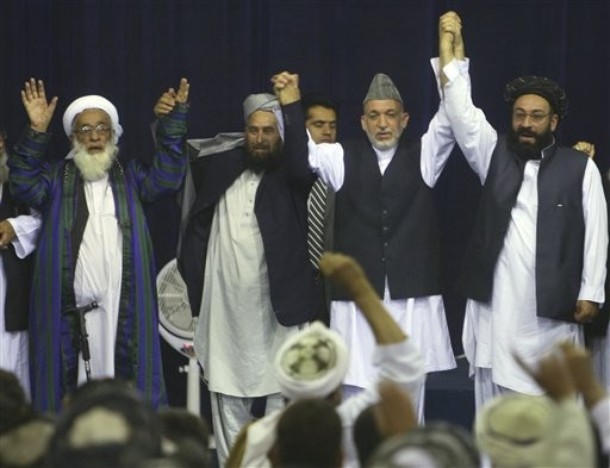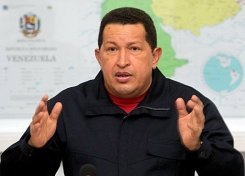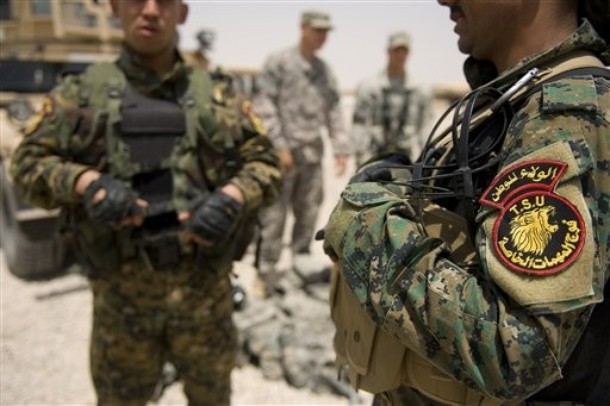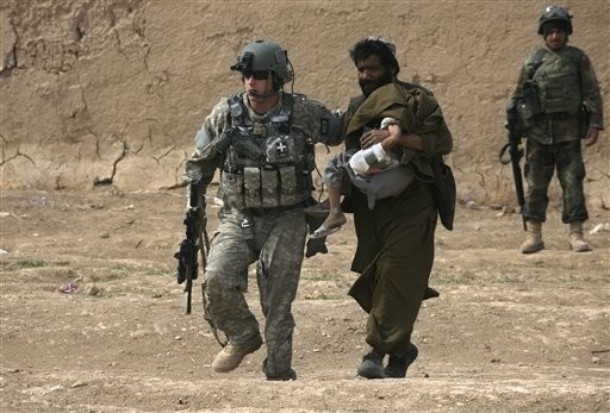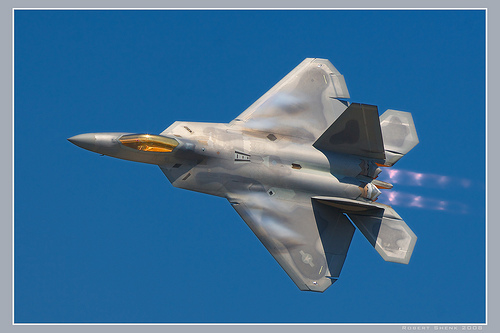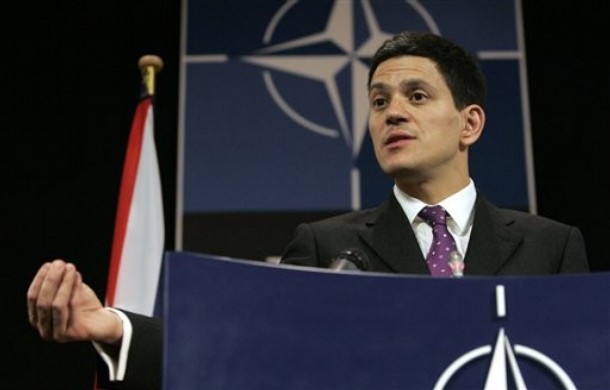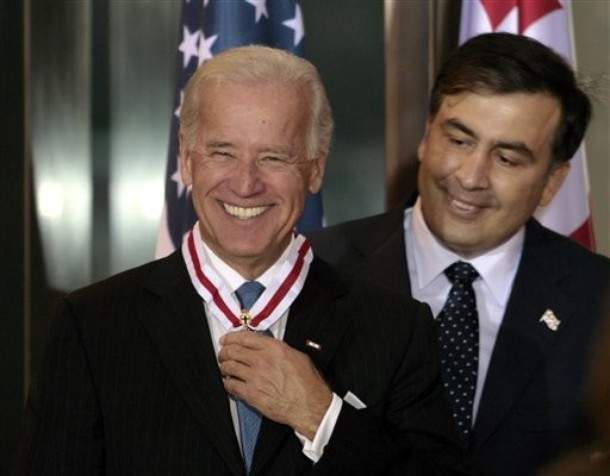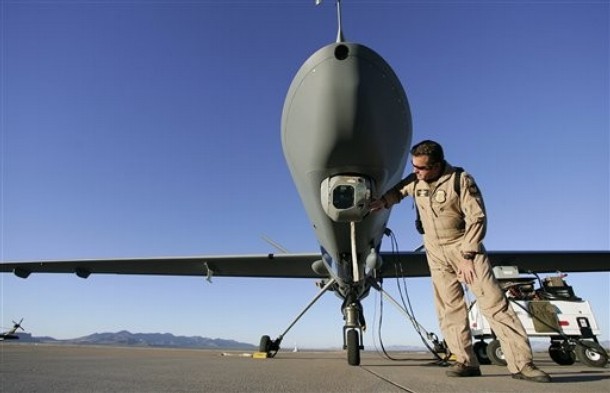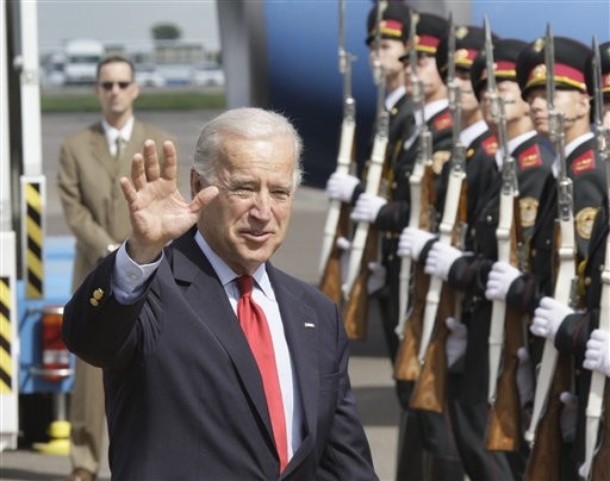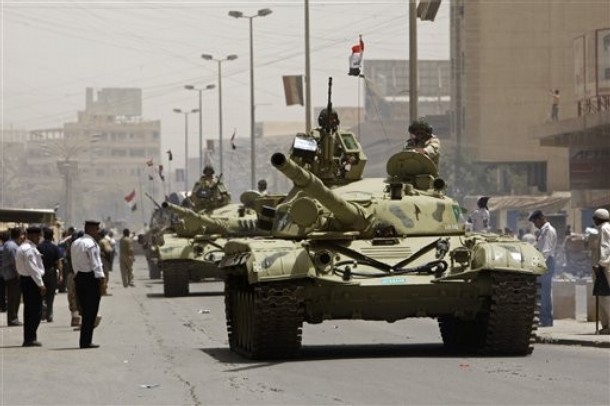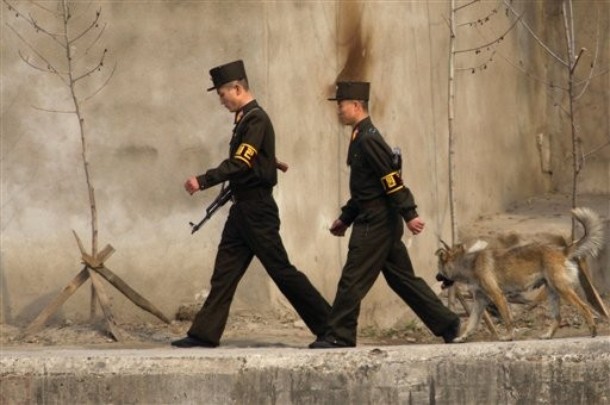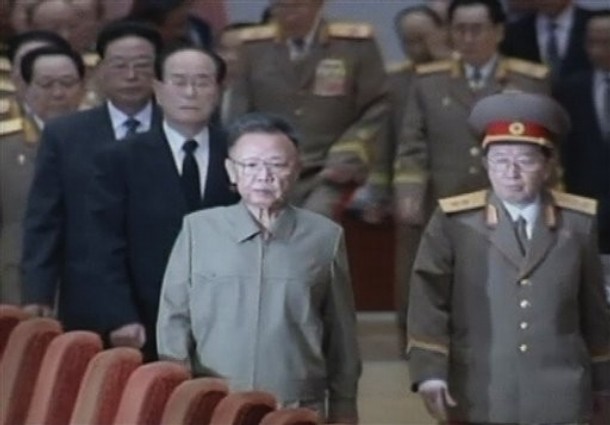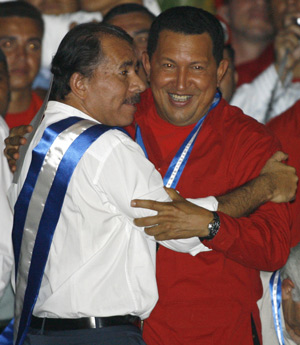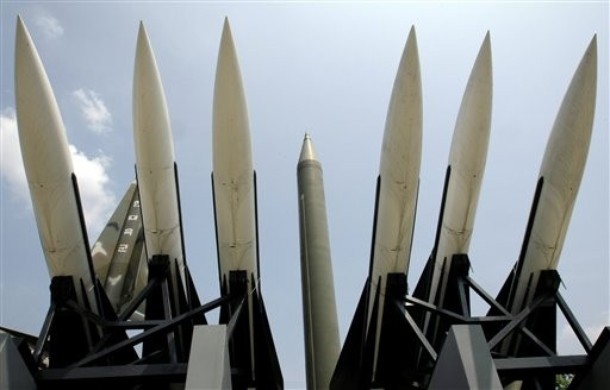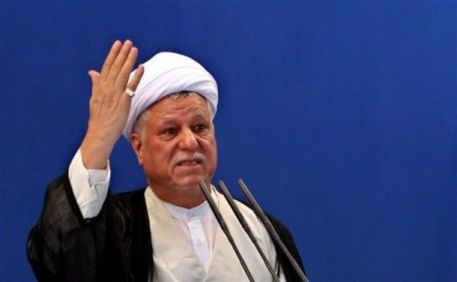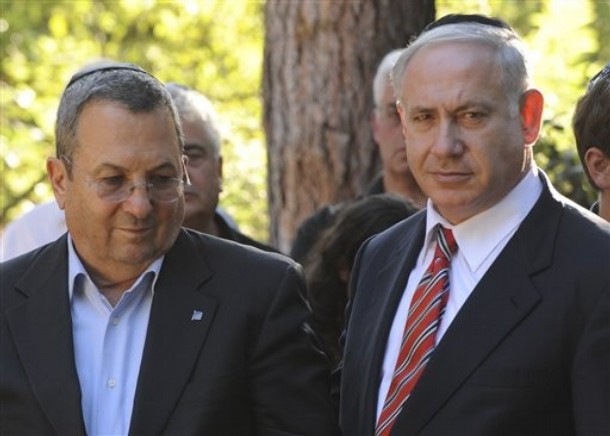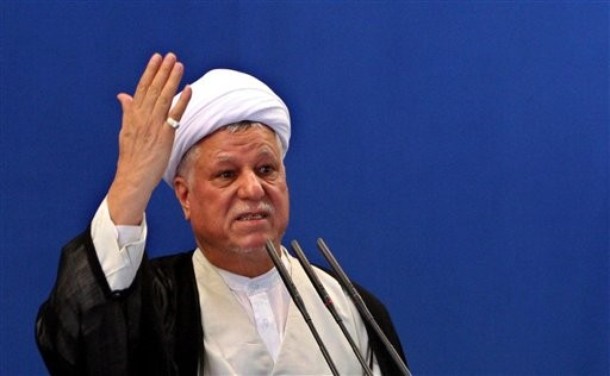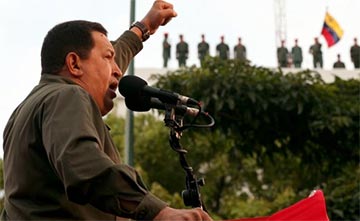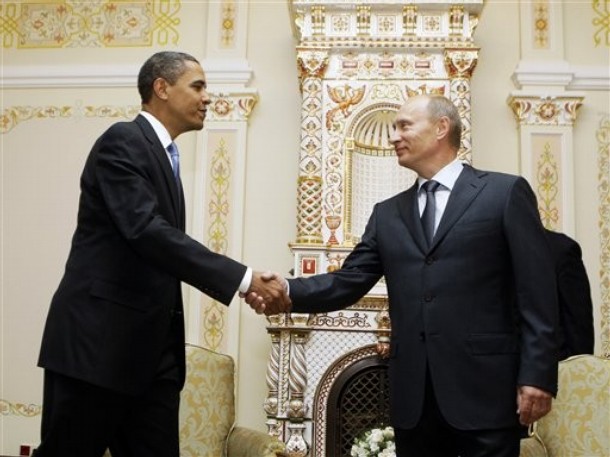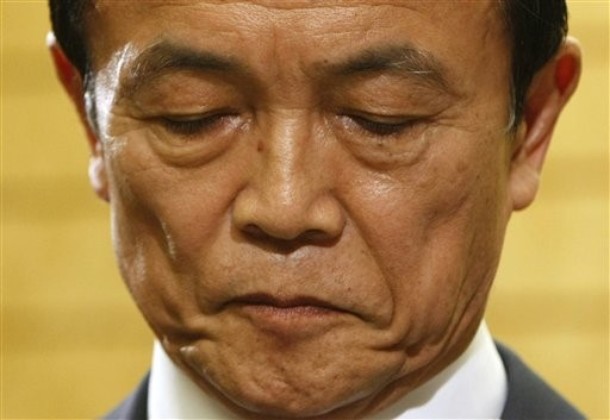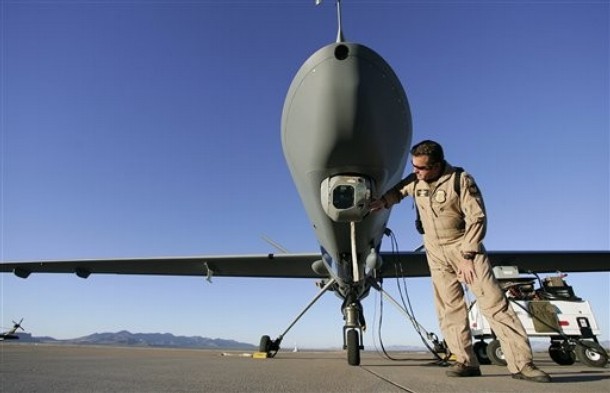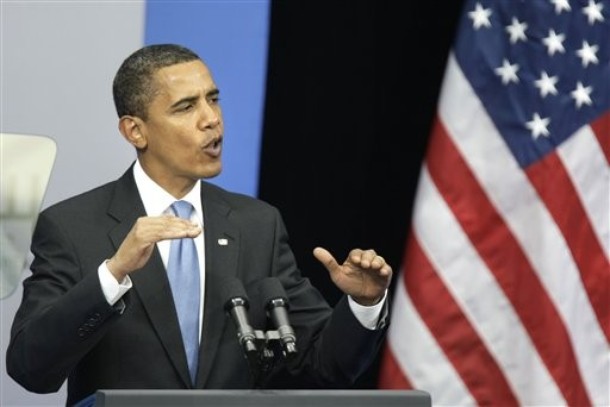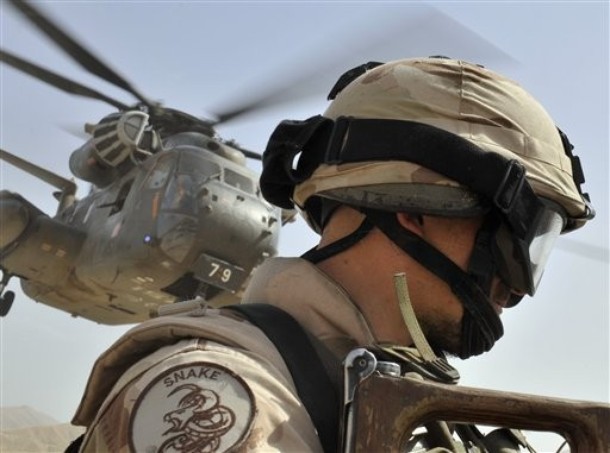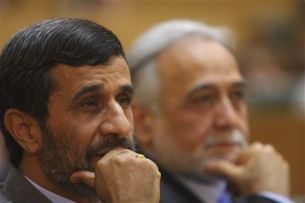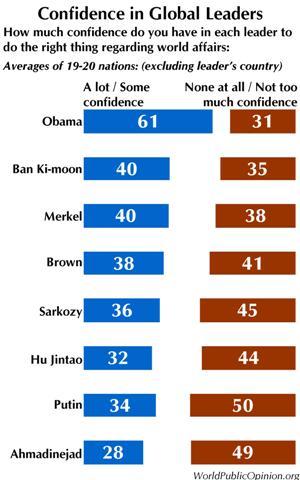
The remarks of President Obama and President Medvedev at the Kremlin yesterday, after the jump.
--
Photo Credit: AP Photos
PRESIDENT MEDVEDEV: (As translated.) Distinguished ladies and gentlemen, ladies and gentlemen of the press, colleagues, we have just completed our negotiations with the U.S. President. The first visit of U.S. President Barack Obama in Russia was a very busy one. The first day showed that we managed to discuss all the items of our agenda, and it was a very big one.
I would like from the outset to say that there was a very useful and very open business-like conversation. This, no doubt, was a meeting that has been expected, both in this country and the United States of America, and on which not only the future of our two country depends but also, to a large extent, the trends of world development.
I would like to emphasize once again, of course, the first day of negotiations, our meeting in -- one on one and in a limited composition and a larger composition were very open and sincere. And this is extremely important. We have agreed that we will continue to communicate in this mode further on. In reality, for our relations, it is very important and it is not a simple job, because the backlog of problems is quite impressive.
But we have enough of mutual wish and will and the positions of principles that we have always occupied and still occupy, to make the discussion of these problems in a business-like manner. And we have reached mutually beneficial results.
I would like to emphasize that each of our countries understand its role in its own way, but at the same time we realize our role and responsibility for the situation in this world -- especially in a period when the level of globalization has reached such dimensions and such parameters that the decisions we make very often determine the situation in general. And such powerful states as the United States of America and the Russian Federation have special responsibility for everything that is happening on our planet.
We have many points of convergence, many mutual interests, and global and economic ones and a variety of other interests. But our desire to discuss these subjects was mutual and this is also one of very important results of our meeting since the work we are doing requires goodwill, mutual respect, and honest understanding of each other's position.
We also came to the conclusion that Russian-American relations and the level achieved today does not correspond to their potential, to the other possibilities of our countries. And the important thing is that the level that we have today does not correspond to the need of the current age, and without active development of our relations on the foreign affairs agenda, on scientific, trade, educational, relations will not be able to build the road to the 21st century.
We have spent several hours in very busy negotiations, very specific, and at the same we dwelled on the questions of philosophy of our cooperation. I'm grateful to the President of the United States for the understanding he showed on the principles that we put forward and our attention to the proposals made by the American side. So despite of the fact that in several hours we cannot remove the burden of all the problems, we have agreed that we will go forward without stopping; that we will make the decisions that are needed for the development of relations between our two countries.
We have discussed quite specific problems, and I would like to share some of them with you. We, of course, discussed international subjects. We spoke about such difficult problems as the process of Middle East settlement. We agreed to continue our work, taking into account the visits we had in the Middle East recently, and the plans that we discussed. We discussed the possibility of holding Moscow conference on the Middle East.
We spoke about a very important subject that is extremely -- requires the coordination of our activities. This is the problem of Afghanistan. Without our joint work in that area, we would not be able to achieve success in that area, and on that score we have agreed on a special statement.
Our relations will be also consolidated by our links in the humanitarian field, in the field of science. This has to be done by all means, and we'll be dealing with this after this meeting in a very persistent way.
Now, a few specific results of our negotiations. You are aware of them. We have agreed on a very important subject, the new agreement of strategic offensive arms. So this is a basic element of our mutual security. The work was very intensive and I must admit that our teams, our delegations, worked on this subject in a very fruitful way. They have showed reasonable compromise, and I would like to thank everyone who took part in these negotiations or is going to take part in them.
A result of this is that we have reached not only mutual understanding of what -- how we should move forward, but also to the basic levels on which we will advance our cooperation in those fields. We agreed on the levels of carriers and warheads, meaning that this is a very concrete subject.
In the mutual understanding, as we have just signed with the President of the United States, it is said that our two countries can have from 500 to 1,100 carriers of strategic arms, and from 1,500 to 1,675 warheads. These are the new parameters within which our dialogue will be going on and where we hope to achieve final agreement that will be part of the new treaty.
We have agreed also that the offensive and defensive systems of both countries should be considered together. We have adopted a joint statement on ABM. And this is also an important result of our work, even taking into account that we have divergences on a number of items. Nevertheless, we managed to sign -- to approve a joint document.
We have discussed measures of cooperation in the nuclear field and the most important is that we will continue our cooperation in every area, and a lot depends on our countries. We have signed an agreement on military transit to Afghanistan. We decided to create a presidential commission on cooperation, which will be coordinating relations among various agencies of the United States and the Russian Federation, respectively, in all priority areas, including economic and military areas.
In the military area, these questions will be dealt by the chiefs of staffs that have just signed the document, General Makarov and Mullen.
Soon all these documents will be published and you will be able to familiarize yourself with them. On the whole, by characterizing our first day of work and the results of negotiations that we have had, I would like to say that I view them as a first but very important step in the process of improving full-scale cooperation between our two countries, which should go to the benefit of both states. And if both states benefit by it, that means everybody will benefit by it.
I would like to emphasize in conclusion that our country would like to reach such a level of cooperation with the United States which would be realistically worthy of the 21st century, which will ensure international peace and security. This is in our interest, and we are grateful to our American colleagues for the joint work we have done.
It is true that the solution of many world problems depends on the joint will of the United States and Russia. Thank you.
PRESIDENT OBAMA: Good afternoon, everybody, and I want to thank President Medvedev and the Russian people for their hospitality. Michelle and I and our children are pleased to be here in Moscow, and to be here so early in my administration.
We've just concluded a very productive meeting. As President Medvedev just indicated, the President and I agreed that the relationship between Russia and the United States has suffered from a sense of drift. We resolved to reset U.S.-Russian relations, so that we can cooperate more effectively in areas of common interest. Today, after less than six months of collaboration, we've done exactly that by taking concrete steps forward on a range of issues, while paving the way for more progress in the future. And I think it's particularly notable that we've addressed the top priorities -- these are not second-tier issues, they are fundamental to the security and the prosperity of both countries.
First, we've taken important steps forward to increase nuclear security and to stop the spread of nuclear weapons.
This starts with the reduction of our own nuclear arsenals. As the world's two leading nuclear powers, the United States and Russia must lead by example, and that's what we're doing here today. We have signed a Joint Understanding for a follow-on treaty to the START agreement that will reduce our nuclear warheads and delivery systems by up to a third from our current treaty limitations. This legally binding treaty will be completed this year.
We've also agreed on a joint statement on nuclear security cooperation that will help us achieve the goal of securing all vulnerable nuclear materials within four years -- progress that we can build upon later this week at the G8 summit. Together, these are important steps forward in implementing the agenda that I laid out in Prague.
As we keep our commitments, so we must ensure that other nations keep theirs. To that end, we had constructive discussions about North Korea and Iran. North Korea has abandoned its own commitments and violated international law. And that's why I'm pleased that Russia joined us in passing a U.N. Security Council resolution that calls for strong steps to block North Korea's nuclear and ballistic missile program.
Iran also poses a serious challenge through its failure to live up to international obligations. This is not just a problem for the United States. It raises the prospect of a nuclear arms race in the Middle East, which would endanger global security, while Iran's ballistic missile program could also pose a threat to the broader region. That's why I'm pleased that we've agreed on a joint statement on cooperation on missile defense, and a joint threat assessment of the ballistic missile challenges of the 21st century, including those posed by Iran and North Korea.
Second, we have taken important steps forward to strengthen our security through greater cooperation.
President Medvedev and I agreed upon the need to combat the threat of violent extremism, particularly from al Qaeda. And today, we've signed an agreement that will allow the transit of lethal military equipment through Russia to Afghanistan. This is a substantial contribution by Russia to our international effort, and it will save the United States time and resources in giving our troops the support that they need.
Thanks to Admiral Mullen and his Russian counterpart, we've also agreed to resume military-to-military cooperation between the United States and Russia. This provides a framework for improved cooperation and interoperability between our armed forces, so that we can better address the threats that we face -- from terrorism to privacy. We've also agreed to restore a Joint Commission on Prisoners of War and Missing in Action, which will allow our governments to cooperate in our unwavering commitment to our missing servicemen and women.
And third, we've taken important steps forward to broaden our cooperation on a full range of issues that affect the security and prosperity of our people.
President Medvedev and I are creating a U.S.-Russian Bilateral Presidential Commission to serve as a new foundation for this cooperation. Too often, the United States and Russia only communicate on a narrow range of issues, or let old habits within our bureaucracy stand in the way of progress. And that's why this commission will include working groups on development and the economy; energy and the environment; nuclear energy and security; arms control and international security; defense, foreign policy and counterterrorism; preventing and handling emergencies; civil society; science and technology; space; health; education; and culture. And this work will be coordinated by Secretary Clinton and Minister Lavrov, and Secretary Clinton will travel to Russia this fall to carry this effort forward.
Just to give you one example of this cooperation, is the new Memorandum of Understanding on health. We've learned -- most recently with the H1N1 virus -- that a disease that emerges anywhere can pose a risk to people everywhere. That's why our Department of Health and Human Services will cooperate with its Russian counterparts to combat infectious, chronic, and non-communicable diseases, while promoting prevention and global health.
Finally, I'm pleased that Russia has taken the important step of lifting some restrictions on imports of U.S. livestock. The cost of these restrictions to American business is over $1.3 billion, and we've now made important progress towards restoring that commerce.
I won't pretend that the United States and Russia agree on every issue. As President Medvedev indicated, we've had some frank discussions, and there are areas where we still disagree. For instance, we had a frank discussion on Russia -- on Georgia, and I reiterated my firm belief that Georgia's sovereignty and territorial integrity must be respected. Yet even as we work through our disagreements on Georgia's borders, we do agree that no one has an interest in renewed military conflict. And going forward, we must speak candidly to resolve these differences peacefully and constructively.
President Medvedev and I are committed to leaving behind the suspicion and the rivalry of the past so that we can advance the interests that we hold in common. Today, we've made meaningful progress in demonstrating through deeds and words what a more constructive U.S.-Russian relationship can look like in the 21st century. Tomorrow, I look forward to broadening this effort to include business, civil society, and a dialogue among the American and Russian people.
I believe that all of us have an interest in forging a future in which the United States and Russia partner effectively on behalf of our security and prosperity. That's the purpose of resetting our relations, that is the progress we made today, and I once again want to thank President Medvedev and his entire team for being such wonderful hosts and working so effectively with our teams. Thank you.
MODERATOR: Colleagues, now we begin the joint press conference of the President of the Russian Federation and the U.S. President. You will be able to ask two questions. Don't forget to represent yourself. And the first question goes to the U.S. media.
Q Thank you, and good evening to both Presidents. President Obama, I'd like to ask you about the issue of trust, after this period of rocky relations between the countries, but also with the agreements that you've just laid out today. Having spent time with President Medvedev, do you feel like you have full trust in him, and have you settled in your mind who is really in charge here in Russia -- the President or Prime Minister Putin?
And President Medvedev, I'd like to ask you, polling shows that the American people have some hard feelings about -- I'm sorry -- that the Russian people have some hard feelings about America. I'm wondering what you think President Obama can do to try to change this?
PRESIDENT OBAMA: Well, first of all, this is now my second lengthy bilateral meeting with President Medvedev, and we've also had a series of telephone calls and other exchanges. And throughout our interactions, I've found him to be straightforward, professional. He is clear about the interests of the Russian people, but he's also interested in finding out what the interests of the United States are. And we have found I think an ability to work together extremely effectively.
So, yes, I trust President Medvedev to not only listen and to negotiate constructively, but also to follow up -- follow through on the agreements that are contained here today. And, again, I'm very appreciative not only of the manner in which he's dealt with me, but also the manner in which our teams have worked together. If you think about the short time frame from our meeting in London to today and the fact that we have essentially accomplished all the goals that we had set in London -- and these are not insubstantial achievements -- I think it's a good sign for progress in the future.
Tomorrow I'll be having breakfast with Prime Minister Putin. I have not met him before. I'm looking forward to that meeting. My understanding is, is that President Medvedev is the President, Prime Minister Putin is the Prime Minister, and they allocate power in accordance with Russia's form of government in the same way that we allocate power in the United States.
And so my interest is in dealing directly with my counterpart, the President, but also to reach out to Prime Minister Putin and all other influential sectors in Russian society so that I can get a full picture of the needs of the Russian people and the concerns of the Russian people.
And my strong impression is, is that President Medvedev and Prime Minister Putin are working very effectively together. And our interest is dealing with the Russian government as a whole in order to achieve the improved bilateral relationship that I think can be accomplished.
PRESIDENT MEDVEDEV: First of all, I would like to thank President Obama for the kind words he has just said about the spirit and the level of openness we enjoy in our personal relationship. I said something about it already, previously. Personal relationship are very important, especially when you speak about the building of interstate relationship. And when the relationship between the governments and personal relationship are on the same level, positive -- that's always good for the relationship between countries.
Speaking of the attitude towards the American people, they are friendly. I don't see any negative elements there. But when there are problems between the states, when there are negative signals being sent by the government, then of course these signals reflect on the mood of the ordinary people, and thus the better relationship between the countries are more -- the more empathy people have towards each other in different countries.
We touched upon our different tasks between our meeting and the relationship between our countries, new ups and downs. We, during the World War II, saved the world, and there was strategic partnership between us. And now we also have a feeling that a lot depends on our relationship. And the success in delivering on all those expectations, different ones, a lot depends on our efforts, bearing in mind that our people have always had sympathy towards -- empathy towards each other.
MODERATOR: (Inaudible), please, you have the floor.
Q (As translated.) Thank you. I have a question to both Presidents. Russia and the U.S. are the largest nuclear powers in the world, accounting for 95 percent of warheads. You have been working on the documents on the NPT for quite some time -- in fact, since 1970s. Do you think you will be able to have the situation in the NPT area under control when there are so many negative trends around the globe?
PRESIDENT MEDVEDEV: Well, the non-proliferation problem is very important for our countries because we have and share the largest burden in the area of non-proliferation of strategic arms. We do have the major nuclear arsenals and we have full responsibility for those arsenals. And I agree with you totally -- there are negative trends in the world and they are due to the emergence of new nuclear players. Some of them are not officially members of the nuclear club, but they have aspirations to have nuclear weapons and declare so openly or, which is worse, doing it clandestinely. And of course it has a very negative bearing on the world.
And due to reasons very well known, there are regions around the world where the presence of nuclear arms would create huge problems, and these are areas where we should concentrate our efforts together with our American partners.
Those regions, those areas, are well known. There is no sense in naming them. But it's quite obvious that on the situation in the Middle East, on the Korean Peninsula, will depend the climate throughout the globe. It's our common, joint responsibility and we should make our utmost to prevent any negative trends there. And we are ready to do that. Our negotiations with President Obama have demonstrated that we share the same attitude towards this problem.
PRESIDENT OBAMA: Well, I think President Medvedev said it well. This is an urgent issue and one in which the United States and Russia have to take leadership. It is very difficult for us to exert that leadership unless we are showing ourselves willing to deal with our own nuclear stockpiles in a more rational way. And that's why this post-START agreement is so important, and I'm hopeful that we can reduce our nuclear arsenals by as much as a third and hopefully can move even beyond that in subsequent agreements and treaties.
The critical issue that President Medvedev identified is the fact that we are seeing a pace of potential proliferation that we have not seen in quite some time, and he mentioned two specific areas. In the Middle East, there is deep concern about Iran's pursuit of nuclear weapons capability not simply because of one country wanting nuclear weapons, but the fact that if Iran obtained nuclear weapons, it is an almost -- it is almost certain that other countries in the region would then decide to pursue their own programs. And we would then see a nuclear arms race in perhaps the most volatile part of the world.
In the Korean Peninsula, we've already seen North Korea flout its own commitments and international obligations in pursuit of nuclear weapons. And in all of these cases, as you see more proliferation of nuclear weapons, the possibilities not only of state actors targeting populations with nuclear weapons, but the possibility that those nuclear weapons could fall into the hands of non-state actors, extremist organizations, poses an extraordinary threat to both Russia and the United States.
So I'm pleased on the progress that we've made so far. I think the fact that we got a joint threat assessment in terms of what ballistic missile capabilities and nuclear weapons could pose to our countries, that we will be conducting a review of that and making assessments to find ways that the United States and Russia can cooperate more effectively, that's going to be very important.
I think continuing the pursuit of cooperation that already exists between Russia and the United States on loose nuclear materials and making sure those are secure, I think that's going to be very important. Structuring a new, reinvigorated non-proliferation treaty that applies a set of rules to all countries, allows them to pursue peaceful nuclear energy without having the capacity to weaponize that nuclear capacity, that is going to be very important.
And so we've actually suggested a global nuclear security summit that we intend to host next year, and I discussed with President Medvedev the strong possibility that in a subsequent summit it could be hosted by Russia, where we bring all the countries together around the world to start making progress on this critical issue.
MR. GIBBS: Matt Spetalnick from Reuters.
Q Thank you. Deep divisions over a proposed U.S. missile shield have contributed greatly to the deterioration of U.S.-Russian relations in recent years, and it does not seem that you gentlemen have finally resolved that issue either. President Obama, you have said very clearly that you would not accept the linkage between the missile systems and arms control talks. President Medvedev, you and Prime Minister Putin have said that these issues must be linked. Are either of you gentlemen willing to budge or compromise on this issue? And if not, could this also contribute to a blockage or obstacle to reaching a final START II agreement?
And also, President Obama, I wonder if you could give us your reaction to the Chinese government crackdown in the northwest of the country on rioting and unrest that has killed more than 140 people.
PRESIDENT OBAMA: With respect to the China situation, unfortunately I've been travelling all night and in meetings all day, so I have not been fully briefed and I don't want to comment until I actually see all the information. But I assure you that our team will get a statement to you as soon as I've been able to do that.
On missile defense, we have agreed that we are going to continue to discuss this critical issue. That is part of the joint statements that we've signed. I also believe that it is entirely legitimate for our discussions to talk not only about offensive weapon systems but also defensive weapon systems.
Part of what got us through the Cold War was a sufficient sense of parity and deterrent capability; that both sides during those very difficult times understood that a first strike, the attempt to use nuclear weapons in a military conflict against the other, could result in a extremely heavy price. And so any discussion of nuclear strategy, security, has to include defensive as well as offensive capabilities.
The difference that we've had has been on the specifics of a missile defense system that the United States views as a priority not to deal with Russia, but to deal with a missile coming in from Iran or North Korea or some other state, and that it's important for the United States and its allies to have the capacity to prevent such a strike. There is no scenario from our perspective in which this missile defense system would provide any protection against a mighty Russian arsenal.
And so, in that sense, we have not thought that it is appropriate to link discussions of a missile defense system designed to deal with an entirely different threat unrelated to the kinds of robust capabilities that Russia possesses.
Now, having said that, President Medvedev has been very clear that this is a point of deep concern and sensitivity to the Russian government. I suspect when I speak with President -- Prime Minister Putin tomorrow, he will say the same thing. And what we would like to do is to work with Russia to advance a system that ensures that a stray missile, whether it was one or 10 or a handful of missiles coming from a third source, that we have the capabilities to prevent those from doing damage. I think we can arrive at those kinds of understandings, but it's going to take some hard work because it requires breaking down longstanding suspicions.
With respect to this particular configuration that was proposed several years ago, as you know, we're undergoing a thorough review of whether it works or not, what has been proposed. That review should be completed by the end of the summer and I indicated to President Medvedev that as soon as that review is complete, we will provide the Russian government our assessment of how we think we should proceed, and that will be the subject of extensive negotiations.
So, ultimately, I think the more progress we make on some of the issues that I discussed earlier -- non-proliferation, being able to track ballistic missiles coming from other sources -- to the extent that we are building deeper cooperation on those fronts, I think the more effectively we're going to be able to resolve this issue. I believe that over time we will end up seeing that the U.S.-Russian positions on these issues can be reconciled and that in fact we have a mutual interest in protecting both of our populations from the kinds of dangers that weapons proliferations is posing today.
PRESIDENT MEDVEDEV: I'll say a couple of words on this subject. Of course anti-ballistic missile defense -- not ballistic missile defense, but the problem of the third region area is a difficult subject for our discussion.
But I would like to draw your attention to what President Obama said, and I would like to point it out myself. In our mutual understanding that has just been signed, we talk about the linkage between offensive and defensive weapons, and this already constitutes a step forward. Some time ago, on this question, we had all -- only differences. Now this linkage is being stated and this opens up the opportunity of bringing positions closer to each other.
Secondly, nobody is saying that ballistic missile defense is harmful or is posing a danger. It is aimed at resolving a number of practical tasks. The question is of linking this configuration of missile defense with interests of other countries. I would like to point out specially that our American partners, unlike what was happening in recent years, have taken a pause and now are studying this situation. As a result of this, they will formulate their final position.
As at least, this is also a step forward in reaching possible compromise on this fairly difficult subject. Before we just heard that all decisions have been made, they do not concern you, but they present no threat to you. Our position is somewhat different. You're well familiar with it. I'm not going to say it again. Our understanding is that these decisions do concern us and we will have to come to terms on these positions. We realize fully well that the number of threats, including link to the medium-range and ballistic missiles, is not diminishing but is growing in number. So we all have to think about what configuration on the whole the global anti-ballistic missile defense could have. And this, during our limited composition meeting, I mentioned to my colleague.
MODERATOR: Distinguished colleagues, last question. Channel Number One.
Q (As translated.) Good evening. The question is to both Presidents. You spoke about your concerns about Afghanistan. Can you be more specific? What do Presidents think about the situation in that country? There is a feeling that the counterterrorist operation in Afghanistan is having difficulties. And to what extent cooperation between U.S. and Russia in transit can help to improve the situation, in greater detail, please?
PRESIDENT MEDVEDEV: The subject of U.S.-Russian cooperation in Afghanistan is extremely important. It is for this reason we paid so much attention to the discussion of this problem, and we have just signed an agreement that concerns transit. It's an important subject and we will of course continue cooperation with our American counterparts.
As concerns the current situation, it is -- really is not simple. I am not trying to say that it is being worsens, but in many aspects the progress is not available or is insignificant. But we value the efforts that are being made by the United States together with the other countries in order to prevent the terrorist threat that was emanating and still coming from the Afghan soil.
We are prepared in this sense to a full-scale cooperation with our U.S. and other partners, including in transit areas. We are prepared to help in the various aspects. I don't know to what extent -- how quickly the situation will improve. It depends to a large extent to the development of the political system in Afghanistan, to what extent the Afghan government will achieve successes in the economy -- and it's not a simple task.
Nevertheless we are prepared to continue with our efforts, the consultations with the Afghan side. In Yekaterinburg I met the President of that country and I met the President of Pakistan, because both of these problems have to be resolved together. And if we can join our efforts both in the economic peaceful field, and in terms of support of counterterrorist operation, the success will come sooner or later.
In the final analysis, the success, let me emphasis once again, will depend on the maturity of the Afghan state and the readiness of the Afghan society to change.
PRESIDENT OBAMA: Well, as you may be aware, as soon as I came into office, we undertook a thorough review of our Afghan strategy to that point, in consultation with not only our NATO allies but all the forces internationally that have contributed to the efforts there. And we concluded that we had not made as much progress as we should have, given the duration in which we've been in Afghanistan, and that we can improve it.
So our approach has been to say that we need to have a strong security system in place for the Afghan elections to be completed. We have to train Afghan nationals for the army and police so that they can effectively secure their own country. We have to combine that with more effective diplomatic efforts. And we have to focus on development so that, for example, the people of Afghanistan don't have to grow poppy, but have other crops and goods that they can make a living with.
Now, we have just begun the implementation of this new strategy, and so I think it's too early to gauge its success so far. I think by the time that we've completed the next election and the -- either President Karzai or another candidate has taken his seat, then we will be able to I think do an additional review and see what other efforts we can take in order to improve the situation. I will tell you that Russia's participation and contributions to this effort could be extraordinarily important.
Obviously Russia has its own concerns about extremism and terrorism. Russia also has deep concerns about the drug trade and its infiltration into Russia. And Russia has extraordinary capabilities when it comes to training police forces, training armies. And so our hope is, is that as part of the broader presidential commission structure that we've put in place, that we're going to further discuss both the military efforts in Afghanistan but also the development efforts and the diplomatic efforts so that we can make progress.
And President Medvedev is right that this is important for Afghanistan but it's also important with respect to Pakistan. And we're going to have to think regionally in terms of how we approach these problems. Obviously there are countries along the border of Afghanistan and Central Asia that are of deep strategic importance, and it's very important that we also include them in these conversations about how we can move forward.
But I just want to thank again the Russian government for the agreement for military transit. That will save U.S. troops both time and money. And it's I think a gesture that indicates the degree to which, in the future, Russian-U.S. cooperation can be extraordinarily important in solving a whole host of these very important international issues.
All right, thank you very much, everybody.



